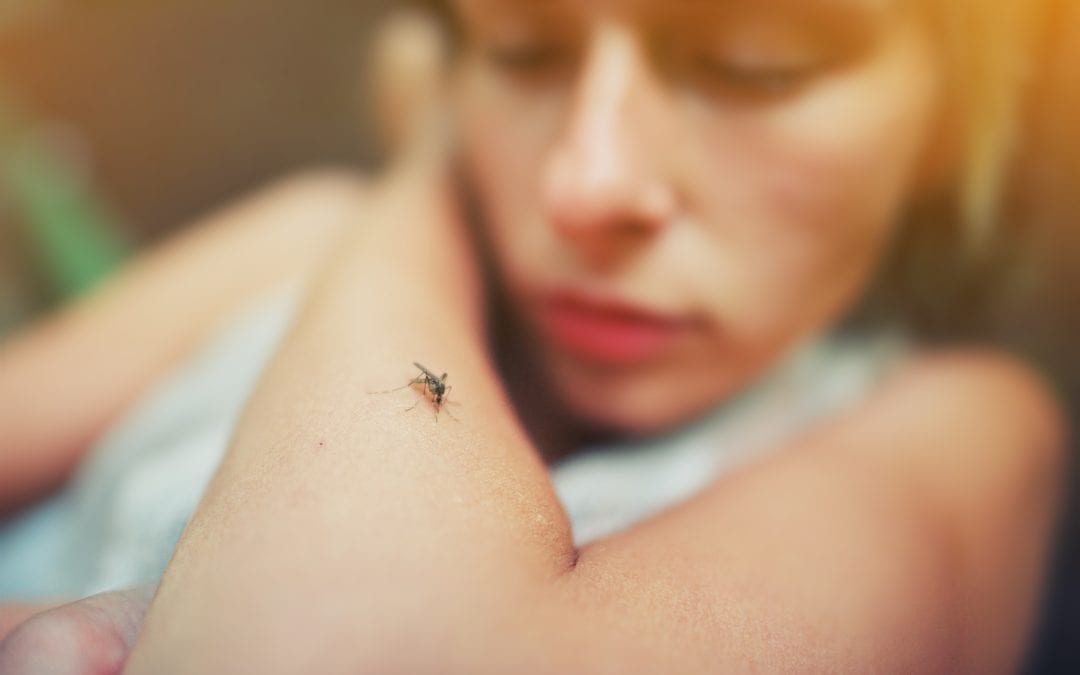Like a creature of the night, mosquitos are buzzing in the dusky evening, searching for fresh victims. With them, they carry dangerous and deadly diseases. When they’ve come across your path, they leave their fateful, itchy kiss as a reminder of their presence.
Maine is no stranger to the pesky mosquito. In fact, more than 40 species live in Maine, with about half of those looking to suck your blood. To keep yourself safe this summer, it’s important to learn about your dreaded night-time enemy and the risks associated with them.
An Introduction to Mosquitos
Just about everyone has had a mosquito bite at some point in their life. The small, raised bump that incessantly itches, driving you close to madness. The itchy irritation comes from chemicals the mosquito injects in you which keep your blood from clotting and reduces the pain.
Interestingly enough, gender plays a role in getting bit by a mosquito. Only female mosquitoes feed on blood. The males prefer nectar and juices. Regardless of their gender, they enjoy the warmer weather, with the ability to grow from an egg to adult size in just five days under the right conditions.
While 40 species living in Maine seems like a significant number, there are actually around 3,000 species of mosquitoes worldwide. Of those 40 species that live in Maine, about half will suck your blood. Typically, you’re most likely to be bit by one of these species between dusk to dawn, with the mosquitoes most active at 80-degrees and unable to function below 50-degrees.
Mosquito season in Maine is generally between June and October. That being said, you aren’t exactly safe the rest of the year. Some mosquitoes, especially overwintering females, can pop up anytime, even during the winter in the right conditions. One reason for this is the ease with which they breed, only needing a couple of tablespoons of standing water to lay eggs that will hatch and grow into a new generation of blood-sucking hunters.
Mosquito-Borne Diseases
Not only will you be guaranteed a small, red, itchy target on you when you meet with a mosquito, but you also run the risk of some seriously dangerous diseases.
Eastern Equine Encephalitis (EEE)
Eastern Equine Encephalitis, or EEE, is a rare but deadly disease that has been known to occur in the eastern United States, including Maine. Its mortality rate makes it one of the most deadly mosquito-borne viruses in the world. Between 2004 and 2013, there were only eight cases nationwide, but of those, 40-percent of the cases were fatal. This quiet killer can cause illness in humans, horses, and birds, and doesn’t have very obvious symptoms. A person infected might experience:
- High fever
- Sore neck
- Headache
- Lack of energy
- Inflammation of the brain
- Coma
- Death
As the virus causes the inflammation of the brain, a person infected with EEE will eventually slip into a coma and could lose their life if the inflammation isn’t rectified.
West Nile Virus
Arguably one of the most well-known mosquito-borne illnesses, West Nile Virus occurs throughout the United States, again including Maine. While it’s more common than EEE, it’s still relatively rare. In 2015, there were just over 2,000 cases reported nationwide, with a 6-percent fatality rate. That totals 119 deaths due to West Nile Virus in one year.
Most people infected with West Nile Virus don’t show any symptoms but there are some to watch out for:
- Mild Cases
-
- Fever
- Headache
- Body aches
- Skin rash
- Swollen glands
- Serious Cases
- Neck stiffness
- Stupo
- Disorientation
- Coma
- Tremors
- Convulsions
- Paralysis
- Death
Protecting Yourself
Whether you’re concerned about the potentially lethal diseases mosquitoes carry or you simply want to avoid the inevitable bite, there are things you can do to protect yourself. The first is wearing thick clothing that covers as much of your skin as possible. That would include long pants, long sleeves, and possibly bug netting. This will reduce the chances of the mosquito’s pricking, needle-like stinger reaching your skin.
Insect repellent is a definite must in Maine summers. A sure bet is to use one with DEET. However, there are some all-natural, less chemical-heavy alternatives on the market. The downside with these is they have to be applied more often.
Avoid relying on things like bug zappers and noise machines. Though these products make big promises, there’s no clear evidence that they perform with results that they claim to have. Another common tool is to burn a wick with pyrethrum or citronella. These are effective but only to a point. If you are in a large space or there’s a breeze, these won’t be effective.
Don’t forget to make sure you have tightly fitting windows and doors to keep the would-be invaders from getting in your home.
A big word of advice from the experts: don’t leave standing water. Whether it’s your kiddie pool, gutters, outdoor furniture, or your birdbath, you need to empty the water or at least clean it a minimum of once per week.
Finally, spread the word! If you and all your neighbors are making efforts to reduce the mosquito population in your neighborhood, you’ll have a better chance of reducing your risk of a bite this season. Get together and throw a party, then make sure all pools are emptied and everyone is wearing their DEET. Together you can fight the mosquito population and have a fun, bite-free summer.
